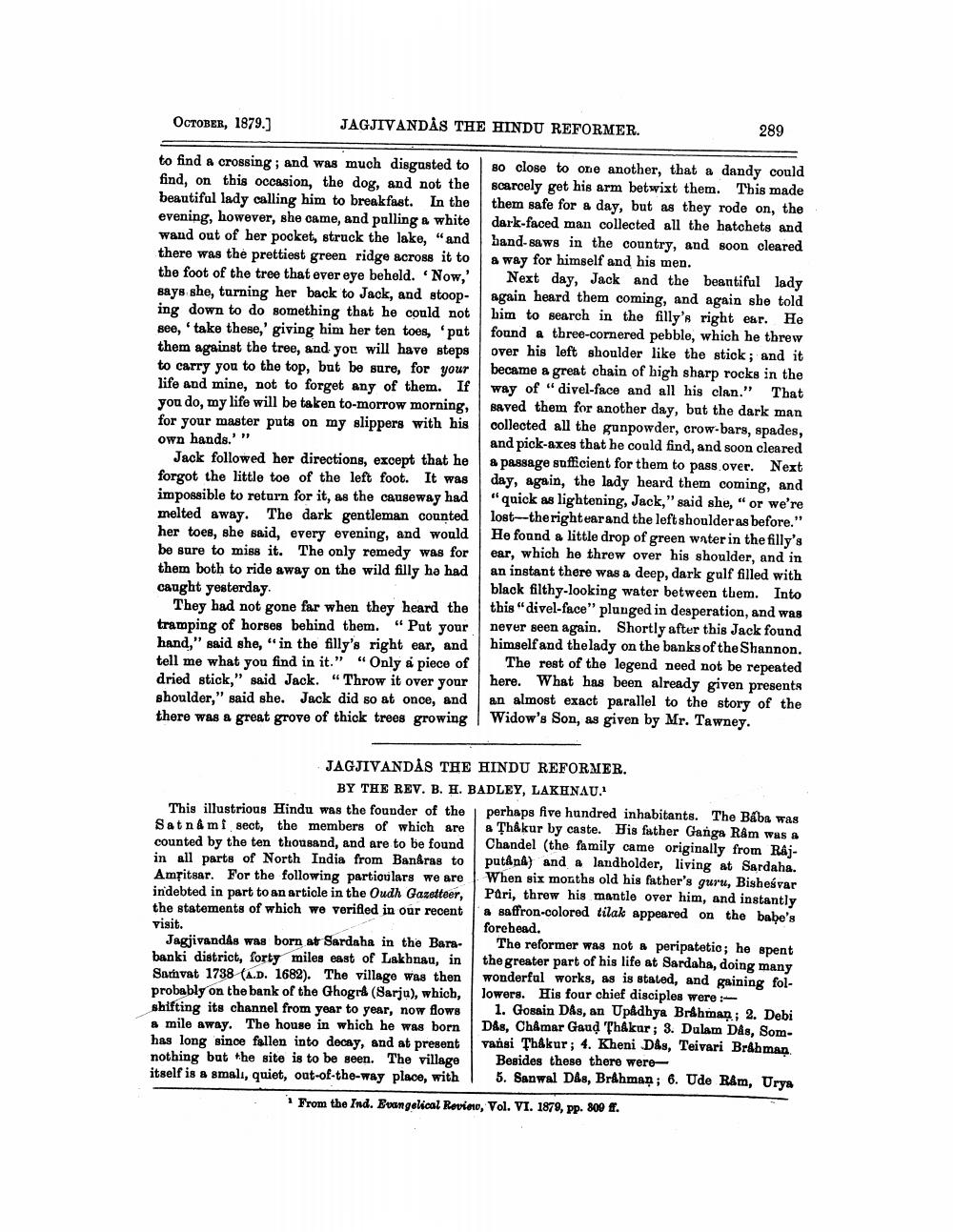________________
OCTOBER, 1879.]
JAGJIVANDÅS THE HINDU REFORMER.
289
to find a crossing; and was much disgusted to BO close to one another, that a dandy could find, on this occasion, the dog, and not the scarcely get his arm betwixt them. This made beautiful lady calling him to breakfast. In the them safe for a day, but as they rode on, the evening, however, she came, and pulling a white dark-faced man collected all the hatchets and wand out of her pocket, struck the lake, "and band-saws in the country, and soon cleared there was the prettiest green ridge across it to a way for himself and his men. the foot of the tree that ever eye beheld. Now, Next day, Jack and the beantiful lady says she, turning her back to Jack, and stoop- again heard them coming, and again she told ing down to do something that he could not bim to search in the filly's right ear. He see, take these,' giving him her ten toes, put found a three-cornered pebble, which he threw them against the tree, and you will have steps over his left shoulder like the stick; and it to carry you to the top, but be sure, for your became a great chain of high sharp rocks in the life and mine, not to forget any of them. If way of “divel-face and all his clan." That you do, my life will be taken to-morrow morning, saved them for another day, but the dark man for your master puts on my slippers with his collected all the gunpowder, crow-bars, spades, own hands."
and pick-axes that he could find, and soon cleared Jack followed her directions, except that he & passage sufficient for them to pass over. Next forgot the little toe of the left foot. It was day, again, the lady heard them coming, and impossible to return for it, as the causeway had "quick as lightening, Jack," said she," or we're melted away. The dark gentleman counted lost--the right ear and the left shoulder as before." her toes, she said, every evening, and would He found a little drop of green water in the filly's be sure to miss it. The only remedy was for ear, which he threw over his shoulder, and in them both to ride away on the wild filly he had an instant there was a deep, dark gulf filled with caught yesterday
black filthy-looking water between them. Into They had not gone far when they heard the this "divel-face" plunged in desperation, and was tramping of horses behind them. “Put your never seen again. Shortly after this Jack found hand," said she, " in the filly's right ear, and himself and thelady on the banks of the Shannon. tell me what you find in it." "Only a piece of The rest of the legend need not be repeated dried stick," said Jack. "Throw it over your here. What has been already given presents shoulder," said she. Jack did so at once, and an almost exact parallel to the story of the there was a great grove of thick trees growing | Widow's Son, as given by Mr. Tawney.
JAGJIVANDÅS THE HINDU REFORMER.
BY THE REV. B. H. BADLEY, LAKINAU. This illustrious Hindu was the founder of the perhaps five hundred inhabitants. The Bábs was Satnam sect, the members of which are a Thakur by caste. His father Ganga Râm was a counted by the ten thousand, and are to be found Chandel (the family came originally from Rájin all parts of North India from Banaras to putAnA) and a landholder, living at Sardaha. Amritsar. For the following partioulars we are When six months old his father's guru, Bisheśvar indebted in part to an article in the Oudh Gazetteer, Pari, threw his mantle over him, and instantly the statements of which we verified in our recent & saffron-colored tilak appeared on the babe's visit.
forehead. Jagjivandas was born at Sardaha in the Bara- The reformer was not a peripatetic; he spent banki district, forty miles east of Lakhnau, in the greater part of his life at Sardaha, doing many Samvat 1738 (A.D. 1682). The village was then wonderful works, as is stated, and gaining folprobably on the bank of the Ghogra (Sarju), which, lowers. His four chief disciples were: shifting its channel from year to year, now flows 1. Gosain Dås, an Upadhya Brahman; 2. Debi a mile away. The house in which he was born Das, Châmar Gaud 'Thakor ; 3. Dalam Das, Somhas long since fallen into decay, and at present vansi Thákur; 4. Kheni Das, Teivari Bråhman nothing but the site is to be seen. The village | Besides these there were itself is a smali, quiet, oat-of-the-way place, with 5. Sanwal D&s, Brahman; 6. Ude R&m, Urya
From the Ind. Evangelical Review, Vol. VI. 1879, pp. 800 f.




